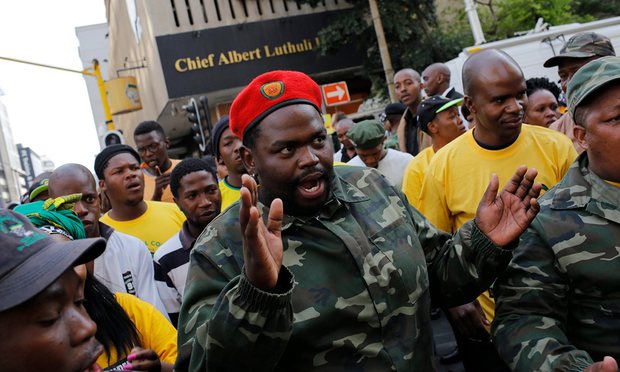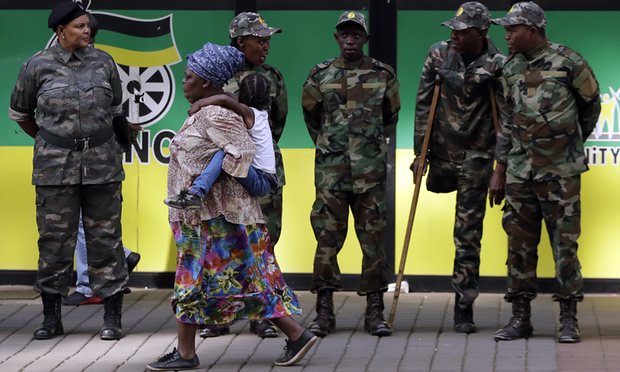
Marching on the headquarters of the African National Congress has a long and sometimes terrible history.
In 1994, the year Nelson Mandela was elected, supporters of the rival Inkatha Freedom party marched on the ANC HQ, then at Shell House. Nineteen people were killed after guards opened fire. Other more recent protests have ended in stone-throwing, jostling and, occasionally, violence.
But what happened on Monday, during the #OccupyLuthuliHouse protest in downtown Johannesburg, was different. It was members of the ANC marching on the ANC. It was a very real sign of the frustration members of the party are feeling, and a further sign that the party is in serious danger of fracturing.
The group that marched on Monday had a simple but impossible goal. They went to demand that president Jacob Zuma be recalled, and the party’s top decision-making body, its national executive committee, should resign en masse.
The mostly young ANC members first said they wanted to occupy the organisation’s headquarters. Then they said they would be satisfied if they could hand over a memorandum of their demands outside the building, which was closed to its own members.
“The ANC is losing power. It’s losing society,” the group said. “Our generation will not sit and watch this. We will never realise our generational mission of economic freedom in our lifetime if we sit and protect patronage‚ anarchy and just watch the ANC die at the hands of parasitic bourgeois.”
But once they arrived outside the building, the ANC youth league blocked their way, joined by members of the uMkhonto we Sizwe Military Veterans Association (MKMVA), people who claim to have been formerly part of the armed wing of the ANC.
This group is controversial. Many of the men in uniform were simply too young to have played any meaningful role in the armed struggle against apartheid. Their organisation has also played a leading role in defending members of the Gupta family, who are accused of paying Zuma for political favours.
There was pushing and shoving. The “military vets” tried to keep the protesters away from Luthuli House. In the process they blocked journalists’ cameras, tried to push them away, swore at them. In some cases, they allegedly told foreign reporters they were “not welcome” in South Africa.

The scenes shocked South Africans. The MKMVA is formed of a group of people who have never been held accountable. They hold no official status in the ANC, no voting power, and are part of no formal structure. They wear uniforms, perform exercises in front of crowds, and supposedly “provide security”, but with no legal authority to do so.
uMkhonto we Sizwe itself was disbanded when the ANC gave up the armed struggle, during the negotiations that led to democracy in the early 1990s. Its veterans’ association is supposed to be a support group, to ensure its members are looked after. And yet it has slowly morphed into something else.
Perhaps the first time the group displayed violent behaviour was in 2012, during an ANC rally where MKMVA members were supposed to keep supporters of Julius Malema, now an opposition party leader, away from the event. No action was taken against them, either by the police or the party.
This time will be no different. Policing the veterans is too political and too complicated for a force whose top leaders have spent the past few years providing armed escorts for senior ANC members.
But the real villain here is the ANC itself. It has never held these people accountable. The people who act violently on its behalf, while wearing ANC uniforms, have never been named, shamed and expelled.
But South Africans simply won’t stand for it. This is a country that might be violent, where many people might see violence almost daily, but any uniformed force that operates outside the law will not be tolerated.
Voters have shown, in August’s local elections, that they are tired of people who are arrogant in power. They are prepared to punish leaders who misbehave.
The protesters now say they will be monitoring the ANC to see if it changes. At the moment, they seem destined to be disappointed. The faction backing Zuma just seems too strong. It has power within the ANC. And the ANC still has power, even though that power is being used to turn on itself.
A version of this article first appeared on the Daily Maverick. Stephen Grootes is the presenter of the Midday Report, on Radio 702 in Johannesburg

